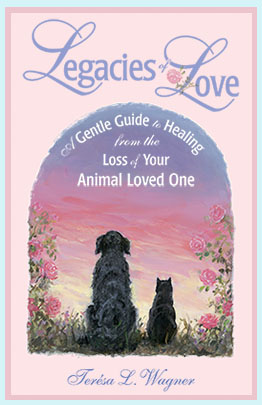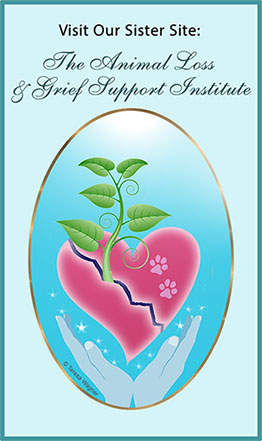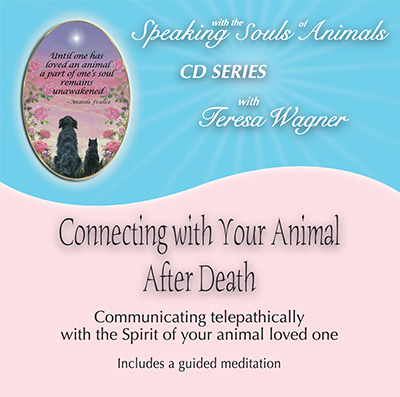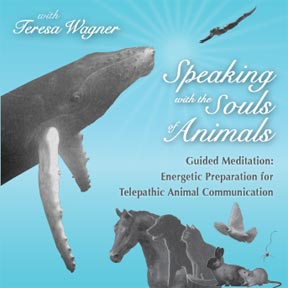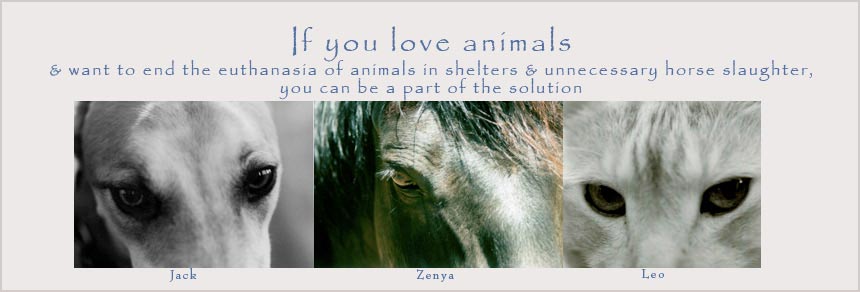Workshops & Events
The Role of Spirituality in The Helping Relationship
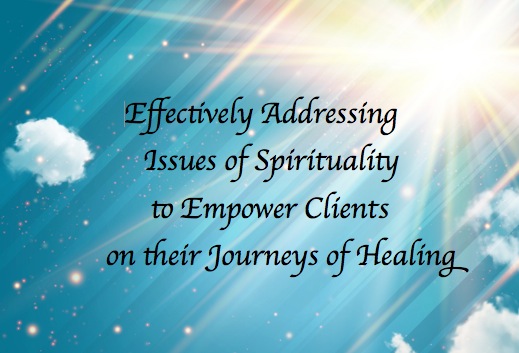
|
LENGTH: |
A two-part teleclass: five total hours |
|---|---|
|
OFFERED |
This is an on-demand teleclass to take anytime, at your convenience. |
|
COST: |
$125 includes: |
|
|
Click here to purchase on demand which includes over five hours of digital audio and 74 pages of handouts. This is a required class in the Animal Loss and Grief Support Training and Certification. If you wish to take this class for credit in the program please see Certification Requirements and This email address is being protected from spambots. You need JavaScript enabled to view it.. |
|
INSTRUCTOR: |
Teresa Wagner, M.S., Program Founder
|
TESTIMONIALS (click to view)
CONTENT AND PURPOSE:
Sometimes, a major loss, trauma or crisis can challenge the very heart of our spiritual beliefs, rocking the foundation of what we have held most meaningful and perceived as truth. As helping professionals, the way we help our clients deal with such crises of faith, and all issues of spirituality, can either enhance or impede their healing process.
- Do you know what the "spiritual bypass" is? Is there any chance you have inadvertently used this with clients and negatively impacted their healing?
- Have you ever worked with a client who is in distress or great inner turmoil because of the conflict between what their priest/rabbi/spiritual teacher is telling them about animal souls and the afterlife for animals and what they believe in their own heart?
- Have you ever been concerned or confused about the gray area between sharing a spiritual concept that you believe will truly help a client but wanting to do it in a way that is not preachy or imposing?
- Have you ever been confronted with a client experiencing a crisis of faith--their beliefs shattered by a major trauma or loss and are now unsure what they believe?
- Have you ever wondered about the best way to handle it when a client’s spiritual beliefs seem to clearly be preventing them from healing or finding peace?
- Did you know that the #1 resented response to loss from mourners are religious and spiritual cliches, such as: “It was God’s will” or “Take comfort in knowing your animal’s soul chose to go; they are happy and whole now on the other side?”
- Have you ever been taken aback by a client’s description of their religious or spiritual beliefs, rituals or practices?
- Have you ever worked with a helper/healer who preached (even softly and kindly) to you regarding spiritual beliefs--expressing their beliefs as if they are the "truth" for everyone, especially you?
These issues and many others are discussed and reviewed in-depth in this class. Whether your professional roles include animal communication, grief support, energy healing, counseling and therapy or any healing arts or helping roles, the information, exercises and resources in this class are designed to help you feel more comfortable, confident and effective in integrating issues of spirituality in your work with clients.
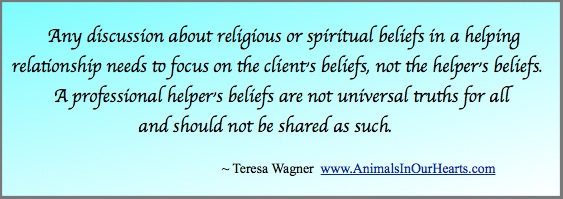
Why a class on The Role Spirituality in the Helping Relationship?
- Crisis of faith and cognitive dissonance are common when experiencing a major loss, crisis or trauma
- The search for meaning is often stronger when experiencing a major loss, crisis or trauma
- Respecting and honoring diversity of belief
- The critical difference between fostering empowerment and proclaiming truth
- A professional helper’s beliefs are not universal truths for all and should not be shared as such
Definitions
- Understanding the difference between spirituality and religion, the difference between spirituality and specific spiritual beliefs, and why the differences are important
Emotional and Spiritual Components of Any Major Crisis, Trauma or Grief
- Sometimes practitioners unwittingly focus on one at the exclusion of the other--to the harm of the client's growth, empowerment and healing
- Ask Don't Tell!
- Anger and hate won't kill you, but pretending you don't feel them might
- Forgiveness: What does it really mean and what is the helper's role?
- The "Spiritual Bypass"--an amazingly popular and deeply harmful healing approach
Clarifying and Reflecting on Our Own Spiritual Beliefs
- Reflections on the films and video clips viewed
- My overall spiritual beliefs and where they came from
- Levels of comfort and anxiety about death
- My spiritual beliefs about animal death
- Self-Awareness as a tool to prevent filtering and unconscious proselytizing
Additional Best Practices for Helping Clients with Spiritual Issues
- Intersection of our spiritual beliefs and our clients’ spiritual beliefs: Open and closed belief systems
- The power of language: Being sensitive and deliberate about chocie of terms used with clients
- Case Studies
Making Referrals & Offering Resources
- Offering resources in ways that empower
Resources for Practioners and for Clients
Testimonials
This class is filled with a wealth of resources. The materials, exercises and discussion invite the participant to reflect, shift and grow, thus deepening their skills when helping people.
I like all the re-wordings offered. Those, along with having case scenarios & exercises, helped me think and reflect on what to say or not say in a situation, both so helpful. Doing the exercises really made me think about my position, feelings and beliefs. Some were easy and some were difficult to look at. I am grateful for that because it helped me see my own filters better. Sometimes I think I have accepted some things as truth just because they sounded good - so no real in depth consideration was given - so I really enjoyed taking the time to do the exercises.
As always, Teresa's manner is thoughtful and considerate. She shares the information gracefully, and invites input and discussion from the audience. I always feel welcome to share my feelings. Teresa is skillful at addressing the comments and discussion on any questions that come up during the course.
~ Julie L, Madison, WI
Fascinating class that explores such important topics related to spirituality and the helping professions! I learned a lot about myself and about how to better support my clients. I feel like this course should be offered in colleges for any social work/psychology programs. It's such important information.
The section about anger/hate/forgiveness was so valuable on both a personal and professional level. These are issues that everyone can benefit from exploring! Teresa is always insightful, respectful and knowledgeable!
~ Shawna R, Pennsylvania
The class was FABULOUS. Many things applied to me that I hadn't fully understood before; such as thinking if I'm spiritually okay with grief, I shouldn't feel emotional pain. Not true.
~ Lynn L, USA
A well organized class. It illustrated how easy it is to let our own beliefs creep into our interaction with clients. And reminded me to talk less, listen more. Good counseling is "ask, don't tell." This was stressed over and over, and for very good reason. The exercises of putting pen to paper makes us go deeper into the exercise and experience, rather than just thinking about it. Teresa is compassionate, human, and wise, a great combination. Well organized and good reading lists. Thank you.
~ Nancy S, California
The class was very informative. The exercises and examples were excellent. The topic has potential to be very boring, but it was not boring at all. Teresa is a high caliber teacher with much to offer those working in the fields of grief support/counseling/therapy and metaphysical fields. Teresa skillfully simplifies concepts which could potentially be overwhelming and provided excellent examples that keep things interesting and fun. My most significant learning from this class is how powerful and hurtful certain words can be.
~ Lori K, Maryland
No matter what class I take with Teresa, I not only learn skills and perspectives to help the client, but I always learn a lot about myself as well. Despite my previous mental health clinician education, I had never been in a class like this, one that delved into the role of spirituality, in all its forms and diversities, and its role in the helping relationship. Learning how to navigate this difficult subject in a loss and grief session, is really invaluable, and can build trust, helping the client to a deeper self-discovery. And no one is better equipped to teach this than Teresa Wagner, a teacher of great vision. All of Teresa's classes are really in-depth, and to me, are on a graduate studies level, yet with her unique way of presenting the material, it is always an enjoyable, lively adventure. And being able to discuss back and forth with the other attendees adds an extra dimension for me, getting all of their very interesting perspectives as well. I am looking forward to the next class!
I always knew that the whole spirituality / religion thing was a touchy issue. And I try to navigate the conversation in the helping relationship as best as I can, but I have really learned to fine-tune this process, thru this class. I learned that there are subtle comments I sometimes make to bereaved people, however innocently, ( " he is in a better place," etc. ) that might be offensive or dis-empowering to a person, be it within the counseling context or just talking socially to acquaintances. I learned in this class that we all have 'filters', ( our own personal belief systems ) that we, sometimes with thinking, impose on others, thru a single well-meaning comment, regarding loss and grief, that could be discordant to another person.
This class was really eye-opening for me.It gave me solid, useful, step-by-step instruction as to how to approach this issue with the client. I learned further how to develop a safe place for the client to explore what is really meaningful to them, in terms of their own spirituality, helping them find what is important, what is grounding to them. All the while, maintaining an atmosphere of great respect for them, in a non-judgmental context. We were given ideas on how to pose questions, what statements to open with, that can really be very helpful, non-threatening, and encourage dialogue and healing for the client.
Learning about those subtle 'filters' we all have and how to turn them off while in a session....also the step by step instructions on appropriate questions, phrases, that Teresa modeled for us, that will encourage discussion rather than accidentally shutting things down. And the movie clips were useful to me, too, where I very quickly learned things about my own feelings about loss, death and spirituality and the rituals, etc. that would be important to me.
There were extremely in depth handouts...in fact, calling them 'hand-outs' is really giving them short shrift ! The 75+ pages of fascinating, well-presented, graduate-level instruction could have been a text-book in itself, not to mention the great resources and book lists in the back pages. A stellar experience !
By watching the clips, doing the exercises, I really learned a lot about myself regarding my own spirituality and what rituals are important to me. And the case studies and modeling were very helpful in visualizing what to do and what not to do, in a helping relationship, in this spirituality context. Reading about this is very helping, but seeing it 'in action" in a modeling situation or case study is very powerful.
I am so glad to have met Teresa! I have visited her website for 15 years and always saw her as one of the few people I have ever encountered who loves animals as much as I do. And her concern, love and respect for all creatures is so apparent in her website, even to people who don't know her. When the time was right, recently, I took the plunge and joined in her class experience and its been really amazing. Her love and respect for all mankind, animals and people, is so apparent and I can't think of anyone else that I would want to learn from at this point in my life.
People can take 'classes' in any university, as I have done, but I don't think they are going to have the fascinating experience they will have taking a class from Teresa. Her particular grasp of spirituality, understanding of psychology, love of animals and vast experience in the field of animal communications, makes her uniquely qualified to offer classes that, in my estimation, can't be found any where else
~ Mary Jane H, Florida
Ethics and Essential Energetic Boundaries
for Grief Support & Healing Arts Practitioners
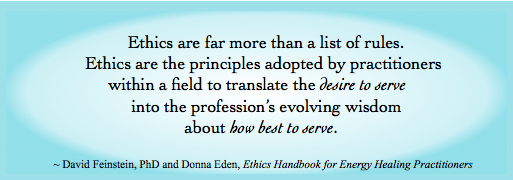
|
LENGTH: |
A 3-part teleclass: 12 hours total audio |
|---|---|
|
|
This is an on-demand teleclass to take anytime, at your convenience. |
|
COST: |
$299 Includes 12 hours digital audio recordings and 119 pages of detailed handouts including 19 case studies. |
|
|
This is a required class in the Animal Loss and Grief Support Training and Certification Program. If you wish to take this class for credit in the program please see Certification Requirements and This email address is being protected from spambots. You need JavaScript enabled to view it.. |
|
INSTRUCTOR:
|
Teresa Wagner, M.S., Program Founder |
CONTENT AND PURPOSE:
Objectives
* Learn methods of energetic protection to be able to remain fully open-hearted and compassionate when working with clients without taking in their pain and energy which reduces the risks of secondary traumatization (compassion fatigue) and burnout.
* Increase understanding about the full nature of "being sensitive"--that it is normal, it is healthy and is a gift that must be handled with continual, conscious care if it is to be enjoyed by those who possess it and used effectively to help others.
* Develop a clear understanding of the dynamics and negative impact of filtering and projection; and learn tools to prevent inappropriate--and often unconscious--filtering and projecting of our own beliefs, ideas and values onto clients.
* Explore the core ethics of the helping professions, with particular attention to the context of grief support as a tool to bridge the gap between our intention to serve with integrity and professionalism and specific guidelines of how to do that.
* Build our awareness of how to set boundaries regarding the logistics and decisions of how we work, when we work, and with whom we work.
Have you ever felt worn out or overwhelmed with your work in helping others? Have you ever struggled with boundaries in client relationships? Have you ever faced an ethical dilemma in your role as a helper or as a client? Have you ever been told you are "too sensitive" for your own good? I think that most of us in professional helping roles have faced these issues at one time or another. I'm very excited about this new class that covers these issues in a dynamic and hopefully fun way with discussions, shared ideas and stories, case studies, hands-on exercises and numerous handouts.
Many of us began our work in the helping professions--whether in counseling, animal communication, grief support or other healing arts--deeply motivated by love, compassion and a genuine heart-felt desire to serve. While this provides a profoundly important foundation, it's not enough. If we don't also consciously develop and use energetic boundaries and ethics in our work, we can inadvertently undermine the effectiveness and quality of the help we offer and also become depleted ourselves.
The practice of consciously using energetic boundaries and protection is one of the most vital and primary areas of competency needed to do any work in the helping professions and to do the work well without becoming burned out, and without violating ethical boundaries--even unwittingly.
This class provides an in-depth opportunity to examine and explore how both ethics and boundaries can be applied in our work to provide clients with a sense of safety, trust and optimum opportunities for healing and growth, and to provide ourselves with energetic preparedness to offer our knowledge and skills with clarity, without bias (including unconscious bias), and with greater ability to be fully present with the stories, pain and trauma of clients and with reduced risk of burnout and compassion fatigue.
Sound ethical practice is good counseling practice,
and good counseling practice requires sound ethical practice.
~ Louis A. Gamino, PhD, Ethical Practice in Grief Counseling
Session 1: Ethics and Our Motivation to Help Others
• The intersection of helper values and beliefs and client values and beliefs: The role and purpose of ethics and guiding principles in the helping professions
• Assessing and Understanding Our Own Motivations to Help
• The Helping Practitioner's Pyramid: The Four Elements of Effective Facilitation of Healing
• Traditional Ethical Principles and Areas of Needed Competence for Hepers
• Awareness and Illumination of Blind Spots
• Code of Ethics of the Animal Loss and Grief Support Professional Program of Study
• Strategies for Thinking Through Ethical Dilemmas:
Who and what needs to be considered? What is the best possible course of action?
• Case Studies: Which ethics and guiding principles apply?
• The Ethical and Legal Issues of Copyright: Guidelines to protect your intellectual property and to respect the intellectual property of others
Session 2: Energetic Boundaries to Protect Clients from Potential Bias, Filtering or Projection
• The role and purpose of energetic boundaries to protect clients in helping relationships
• Obstacles to grief support [and any helping] competence
• The power of language to communicate respect, acceptance and nurturing neutrality
• Effectively handling our own reactions and pain about our client’s loss and pain
• The importance of not exposing clients to our pain or reactions about their loss
• Tools: Internal and external strategies for clearing own values and beliefs during client contact
• Case Studies: Which ethics and guiding principles apply?
Session 3: Energetic Boundaries to Protect Ourselves from Potential Overwhelm and Compassion Fatigue
• The role and purpose of energetic boundaries to protect ourselves in helping relationships
• Concepts and self assessments
• Issues heplers may encounter regarding boundaries of logistics policies and unrealistic client expectations
• Preventing Secondary Traumatic Stress: Managing overwhelming feelings in response to client stories/trauma
• Energetic protection issues for highly sensitive and empathic people
• Tools: internal and external strategies for protection from overwhelm of others’ energy and pain
• Case Studies: Which ethics, guiding principles and tools apply?
Nina McIntosh, author of The Educated Heart, a book entirely about ethics and boundaries says:
Boundaries are like protective circles surrounding the professional relationship. Rather than being barriers that separate us from our clients, good boundaries safeguard both practitioner and client. Good boundaries don’t create walls between client and practitioners: rather, they create a safe space within which we can touch clients’ hearts and ease their spirits.
Without clear, thought-out boundaries, our decisions about boundaries and ethics are likely to be based on a hodgepodge of conflicting influences: our upbringing, our own biases and prejudices, emulation of teachers or mentors who may or may not have good boundaries themselves, and when in doubt, we may throw in a random piece of wisdom from the latest self-help book we’ve read.
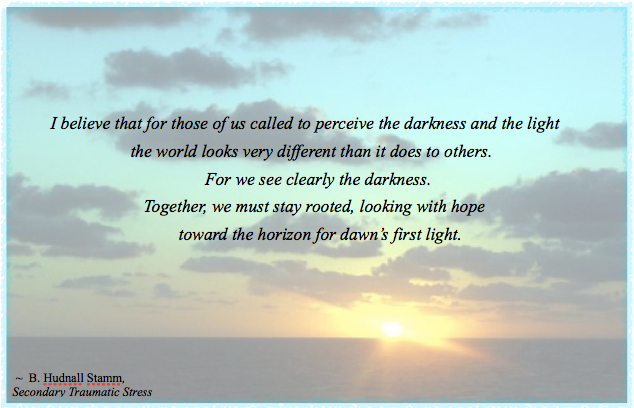
Testimonials
It has changed my whole outlook and opened up my eyes to see how I can be effective for clients. Changed by whole business outlook. Everyone should take this class!!
~ Diane D, Kingston, MA
Very, very good class on boundaries and ethical practices A good reminder to be more protected while in a helping role. Very helpful to look at the individual examples of exercises and case studies.
~ Lori P, Cloverdale, CA
Its a very unique class and addresses so much. I have enjoyed clarifying many grey areas.
Boundaries has been a biggie for me as I work with people and they start to see me as a "friend" then I feel guilty if I cant enable that friendship like I am hurting them. THe class has given me ideas to strengthen my boundaries with love from the beginning. Thank you!
~ Narel W, Tomerong NSW, Australia
The class was magnificent. The written materials were so filled with valuable information and very pleasing to the eye. Teresa's soothing voice and meticulous holding of space brought me immense healing while I learned. Thank you so much for this big gift.
~ Jane S, Santa Maria, CA
I received some wonderful training in the tools of my practice, but knew something was missing. This was it. Principles that I had grasped intuitively but not named became clear and therefore reliably accessible to me. I feel ready to embrace my work as a flower essence practitioner with fresh verve and confidence. As a college professor, I know how valuable "could have been better" comments are in fine-tuning a course. So I wish I had something to contribute. No luck there! Having done a lot of curriculum design, I was constantly aware of how beautifully conceived and implemented this course was. When students are learning happily and easily, you can bet that the instructor has spent countless hours and much deep and detailed thought to create the conditions that make learning seem easy. Teresa is a master teacher.
The Helping Practitioner's Pyramid brings important principles together in an integrated way that can be called on right in the moment for guidance. Only two days after my first class, I was asked to help with a very serious and difficult decision about an animal's health care. I brought the pyramid to my mind's eye and referred to it repeatedly during the session. I found it to be an elegant and reliable guide which contributed considerably to the positive outcome of this conversation.
Doing the exercises in advance primed me for full participation in the class, allowing me to start mulling over issues and how they related to me so that I could take full advantage of the sessions. The case studies helped anchor the principles in real life, and will make it much easier to remember and apply the principles in the future.
Teresa is a trustworthy guide who practices the principles she teaches. She listened carefully to what participants had to say, honored our contributions and skillfully tied our input back to the principles she was teaching. She is a caring presence and skilled teacher.
~ Laurel B, Pasadena, CA
The class was very well prepared. The handouts were actually more complete and thorough and a great prep for each session, much more so than most of the nursing seminars I've attended that have cost more. There was a lot of time to hear comments and ask questions. Teresa was very generous with her time.
~ Kendra L, Los Angeles, CA
Teresa's usual thoroughness and excellent organization made everything very digestible and clear. I got clarity on copyrights and use of materials.
~ Roberta J, Chelsea, MI
Excellent class Teresa!! Great material. Wonderful handouts. Great discussion. You outdid yourself again!!! I am so grateful for this experience!!! Thank you!! Thank you!! Thank you!! I enjoy your classes so much! You are an excellent teacher and facilitator. And one of the most big-hearted most compassionate people I know. I am so grateful for you.
~ Lori K, Fallston, MD
The class was magnificent. The written materials were so filled with valuable information and very pleasing to the eye. Teresa's soothing voice and meticulous holding of space brought me immense healing while I learned. Thank you so much for this big gift.
~ Jane S, Santa Maria, CA
I so admire your integrity in doing whatever it takes to get the information out, clearly and completely! The material on boundaries has framed a couple of conversations with clients this week. Even when I know the material already, it helps (adds to the toolkit) to hear the way you put it. Thank you.
~ Rev. Nancy S, Hayward, CA
Understanding and Preparing for Euthanasia
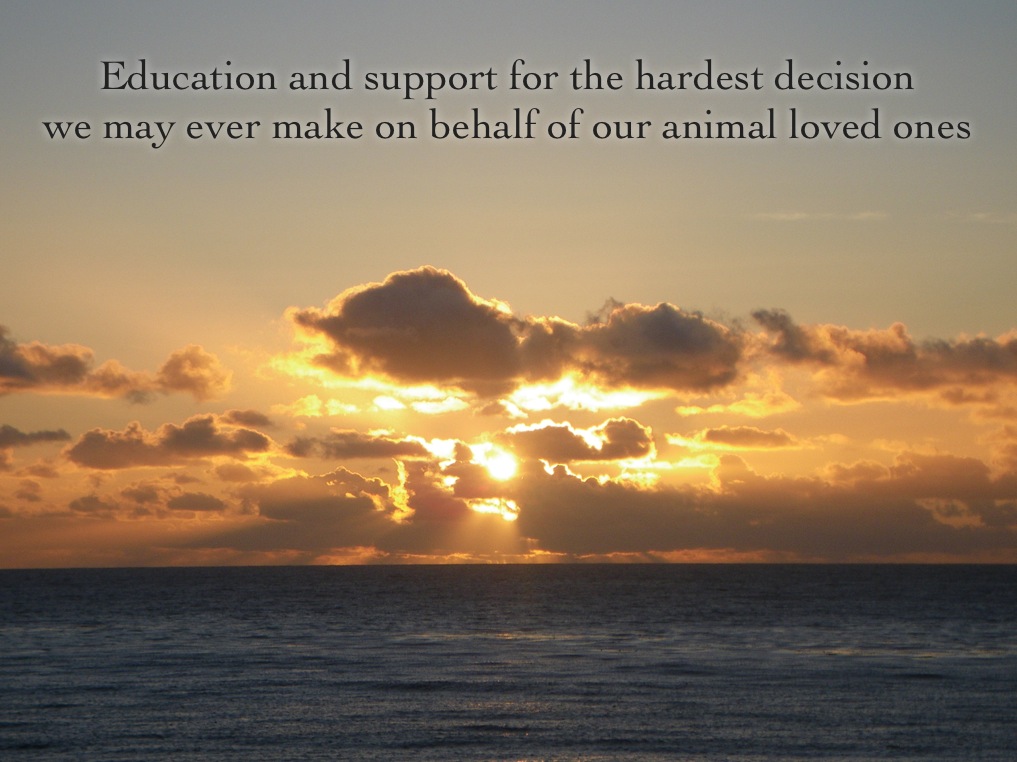
|
LENGTH: |
A 2 part teleclass: 2 hours each session for 4 total hours |
|---|---|
|
|
This is an on-demand teleclass to take anytime, at your convenience. |
|
COST: |
$98 Includes: |
|
|
Click here to purchase This class is one of many in the Animal Loss and Grief Support Training and Certification Program and is a required class for certification. |
|
INSTRUCTOR:
TESTIMONIALS: |
Windi Wojdak, RVT |
CONTENT AND PURPOSE:
For some of us, the mere thought of the day when we will lose our beloved companions to physical death is so full of dread and fear that we avoid any discussion or delay any planning of this inevitable event. Our own fears of death and loss can impact our ability to make the best choices for the animals in our care. Fear of the unknown can be a tremendous source of grief and can lead us to make decisions surrounding our animals' dying that we later regret. By facing our fears and questions before we are confronted with the trauma of an ailing loved one, we can better consider the choices and decisions we may need to make and take the time to develop plans or make changes that can lessen the sense of chaos and confusion to make our parting a time of shared love and connection.
In the right time and circumstances, providing a peaceful release for an ailing companion through euthanasia can be a powerful demonstration of love and respect. Education about the process of euthanasia can help us prevent surprises and minimize discomfort, stress or shock that can be part of the experience for humans saying goodbye to their animal companions. Advanced planning and consideration of our own questions, concerns, fears and beliefs about euthanasia can help us to make more informed decisions and create the best death experience possible for our animals when a choice for euthanasia has been made. If we are able to move past our own fears euthanasia can become a sacred act and a time of powerful connection.
It is very important to consider how our own needs and perceptions factor in to potential care decisions. It can be helpful to take some time to think about our relationship to death and dying, and to consider our underlying beliefs about euthanasia. When facing the death of our own cherished animal, this information can help us to shape an experience that will bring us closer to our companion and make their passing a time of deep honor and connection. When working with clients or others, a clear understanding of our own assumptions and beliefs can help us to remain clear and identify areas that may be triggers for judgment or misunderstanding.
While any discussion of death or dying will necessarily touch on our emotional and spiritual needs at this time, this course will focus primarily on the practical physical considerations regarding euthanasia with the goal of helping participants become more comfortable evaluating the options for their own animals and supporting clients or others in making end-of-life decisions for their companion animals.
• We will evaluate ways of thinking about and evaluating quality of life and other end of life issues.
• We will look at the process of euthanasia and physical death and consider ways to provide the
best process possible for our companions.
• We will discuss ways to help guide a sometimes clinical process to support our relationship with our animals at this sacred time.
Class Outline:
Session 1: Understanding Euthanasia
Defining Euthanasia
Euthanasia vs. Unassisted Death
Clinical Definitions
Anesthesia/Euthanasia and the Brain
Common Protocols for Euthanasia
The Process of Physical Death in Euthanasia
What You May Witness
Practical Decisions
Perspectives of the Veterinary Professional
Session 2: Considering and Preparing for Euthanasia
The Good Death
Facing Fears
Perceptions and Beliefs about Euthanasia
Is it Time? When to Consider Euthanasia
Factors to Consider
Facts / clinical information
Quality of life and pain assessment
Resources / abilities
Communication / insight
Support
Reasons for Euthanasia
Advance Directives
Allowing Flexibility
Dealing with Guilt
INSTRUCTOR: Windi Wojdak, RVT
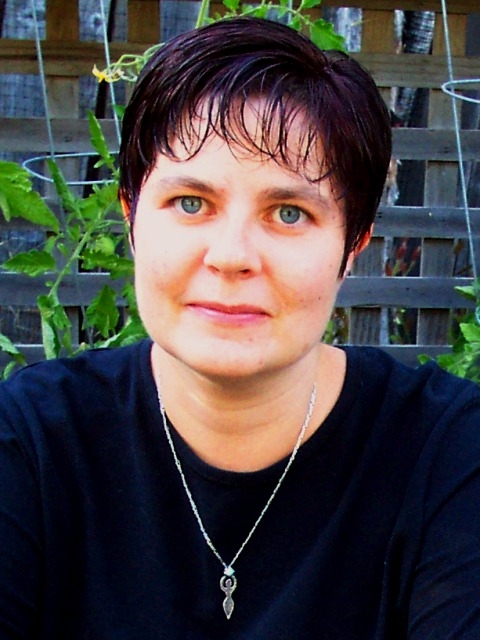
Since becoming a licensed veterinary technician in 2000, she has worked to develop bridges between the veterinary and animal protection communities. She has taught various aspects of animal care and medicine to animal shelter staff and volunteers as well as veterinary students and professionals. She currently manages a national non-profit veterinary outreach program combining community service and veterinary education to bring free veterinary services to under-served rural communities throughout the world. Windi was honored for her work as the 2006 recipient of the California Veterinary Medical Association RVT of the Year award.
Her professional interests include shelter medicine, companion animal anesthesia and pain management, emergency medicine, euthanasia and end of life care. Windi has dedicated most of her life’s work to animal protection and advocacy and is continually in awe of the resiliency of spirit of those who suffer and those who strive to relieve suffering. She sees the act of euthanasia as a sacred responsibility and finds deep meaning in guiding animals and their human guardians through this important time.
COMMENTS FROM PARTICIPANTS
Just having a class on euthanasia has helped. It's been a lonely experience in the past as I've had to go alone and didn't have family or friends that were understanding or supportive. This class has a lot of tools that can be used to help others. The process, knowing that in the excitement stage the animal isn't conscious or in pain, the use of pain shots or sedative shots to help. The ways to spend time with the pet and honor the relationship. Also knowing that it's hard for the vet and staff. I've gained more compassion for the vet and how difficult it can be for them. Every question was well answered and explanations were easy to understand even though I'm not a vet tech.
~ Linda K, Willits, California
Very valuable class. The class was helpful in its scope of the subject of euthanasia, and, as a practicing animal communicator, I know the information given will be very useful in supporting animals and especially their people through what is often a difficult, stressful, and sad time. Most significant learning for me was what happens physically with euthanasia and the importance of good communication with the vet. Windi is a knowledgeable and compassionate presence, thank you!
~ Carla S, Rancho Cordova, California
This class was the first time I had heard the details of euthanasia. I appreciated Windi's eloquence in describing the various aspects of the process, including one's own belief system, physical capability of caregiver, and so many fine details in one package.
As soon as I completed the mp3 recordings and study of the outline, a client called to ask me to communicate with her dog about euthanasia vs. continued "pawspice" [hospice care] that she has been providing. She had broken down, felt guilty, felt incapable of continuing, and all of those things that Windi covered. I was so prepared to answer questions and help her understand some options, as well as to address her 'burnout'. Thank you, thank you.
~ Judy R. Chelsea, MI

